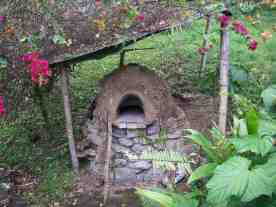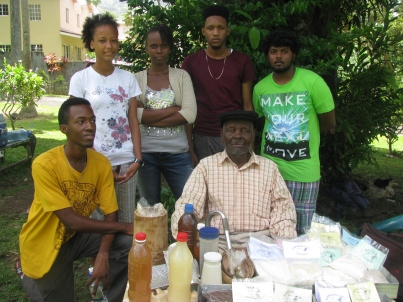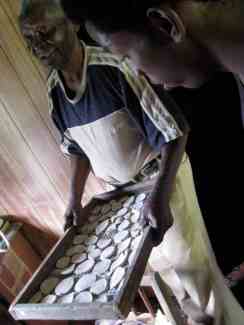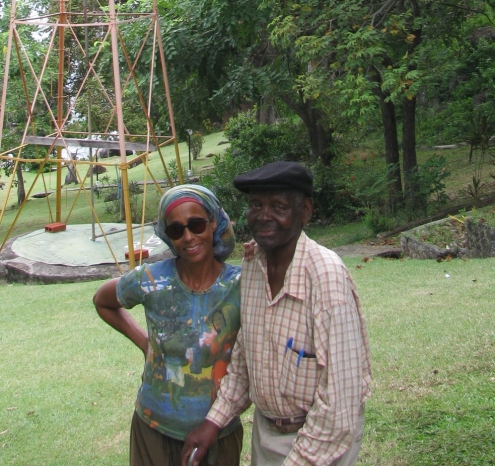 The journey: 1st October 1920- 2nd May 2020
The journey: 1st October 1920- 2nd May 2020
Mr Laurence “Captain” Guy spent his early years traversing St. Vincent’s mountains on foot. When he could no longer walk the distance, his stories traveled far on his behalf, weaving the imaginations of young and old into a network of cultural connection stoked by his experiences- translations from the senses kindled into heart-warming Vincy tales.
It’s ironic that the Thanksgiving Service for the man who knew everyone, was restricted to only 30 to celebrate his life inside the Hope Methodist Church that he designed built the extension to in the 1990s. But nothing would keep the crowd from gathering outside…
Unable to reach back to St Vincent, I sent my tribute as a voice recording. In preparation, I navigated the extensive and memorable corridor of our 15 year-long friendship, searching intently to pluck out a few minutes’ recital that might please him.
Capt’ departed this life as the moon was going down (waning gibbous)- an ideal time to put down roots. With my hands in the earth, the soil spoke of his gentle laughter and it was easy to know what he would want me to say.
“Grow what you Eat and Eat what you Grow”.
The love of making things, growing food and herbs bound us together, as did the pain of seeing young people growing up without the experience of a ‘sumptuous’ (Mr Guy loved that word and used it often) life close to the earth. I had been working for years to repair the frayed connection between islanders and our creative heritage when Mr. Guy and I met and fortified eachother on that mission. I showed him my clay oven and earth house that I built by hand, and he found his home from home. We spent many hours firing up the oven, roasting cocoa beans and telling stories.

During our years of working the land together, we shared each other’s natural farming systems creating synergies between plants and the elements. Mr Guy farmed productively on a quarter acre for over 40 years with no chemical inputs. We processed breadfruit, dasheen, coconut and cassava into flour, cocoa into chocolate, we dried spices, shadombeni, stinging nettle and other herbs to make medicinal teas.
Every week Mr Guy would experiment until we had a range of products. As part of their community service experience, my art students assisted me in selling “Captain Guy’s Homemade” to support him with a small income.

I first took the college students to give Mr Guy “some strength” in his garden in 2007. The weekly visits evolved into an accredited ‘Heritage and the Environment’ course that is still conducted as part of the Associate Degree Art program where intergenerational skills’ exchange form the basis of experiential learning. The students learned his farming methods and recorded his stories, as the knowledge skipped two generations- he was old enough to be their great-grandfather! This was totally new experience for the youths, most were discovering their living heritage for the first time in what was their last chance to experience the art of sustainable heritage practices in an authentic setting. Many started to form deeper connections with their own grandparents. We understood the impact of this experience on their future through improved diet, environmental conservation, community building and eco-entrepreneurship.
Mr Guy was delighted by his student audience and by extension their families, many of whom came to meet him as the students were swept up into home garden projects. We were practicing sustainability education before we heard the term for it!
Nature-based community-restorative practices still occupy my time. The activities now often furnished with jargon to access funding for sustainability education upon which Mr Guy knew our survival depends. While the language may evolve to appeal to technocrats, the praxis remains the same: sustainability education is quite simply about taking care of our inner and outer environments for generations to come through making and growing things from what we already have in our hearts and landscape.
This may be too simple for societies driven by learned complexity. While we gazed overseas for models of practice, in our midst lived Captain Guy: sustainability expert, engineer, conservationist, lumberer, carpenter, farmer and storyteller who lived a long and active life sustained by his own practice of eating what he grew and willingness to share his knowledge. Now his teachings live on in the hands and hearts of others in our midst.


The assumption that natural farming methods cannot produce equal (or exceed) crop yields of mechanised and chemical farming on a small island is not based on scientific fact. We continue to discriminate against our own traditions, poised as they are for adaptation to upscaling. We have forgotten that not so long ago, St. Vincent was the heartbeat of Caribbean agricultural activity, exporting ground provision and livestock to every island in the region. Mr. Guy had first-hand experience of this as an agricultural estate manager in the 1950-60s before chemically intensive farming arrived to generate profits for British companies. His aversion to inorganic farming was fully justified- 50 years later the depletion of nutrients in our food and soil is proven. Will it take another 50 years to realise that what he practiced still provides the answer to food security in a rapidly changing environment?
As we drain more vital life out of our soil through tilling- without regard for the ecology of the soil- as the farmers are being availed of a tractor to till on a wider scale, do we hear the message of a Vincy Elder who trod these lands in their entirety and lived just five months shy of a century?
Although he constantly referred to himself as The Old Soldier’ – throughout life’s challenges and setbacks his spirit remained youthful. He truly was a National Living Treasure living amongst us. We will never forget the importance of what he taught us and how blessed we are that our paths crossed as we honour his legacy and continue to pass on the teachings. In the words of our Afrikan foreparents “We are on a journey, may our heads lead us home.”
As the Old Soldier passes over the Mountain, more stories unravel in his foot steps.
 RIP Captain. Your work continues to grow.
RIP Captain. Your work continues to grow.
